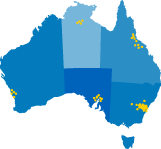 Operation Process
Operation Process
At All Product Recycling, we operate under a simple and straight forward process.
Below is a quick summary of the steps taken in our recycling process:
1 Collection of Plastic Recyclables:

The first step in plastic recycling is to collect the plastic waste from various sources, such as manufacturers, households, and businesses. The plastic waste is then transported to a recycling facility where it is sorted and processed.
Give us a call now (02) 9820 2388 to schedule your next pickup.
2 Inspection & Sorting Plastic Materials:

Once the plastic waste is collected, it goes through an inspection process to ensure that it is suitable for recycling. This involves sorting the plastic waste based on its type and quality. The plastic waste is sorted into different categories, such as PET (polyethylene terephthalate), HDPE (high-density polyethylene), LDPE (low-density polyethylene), and PP (polypropylene).
3 Processing:

After sorting, the plastic waste is processed to make it suitable for recycling. This involves shredding the plastic waste into small pieces, known as flakes or pellets. The plastic waste is then washed and cleaned to remove any impurities and contaminants. The cleaned plastic flakes or pellets are then melted down and formed into new plastic products.
4 Dispatch to Local/Export:

Once the plastic has been processed, it is ready to be dispatched to either local or export markets. The recycled plastic can be sold to local manufacturers who use it to make new plastic products. It can also be exported to other countries where there is a demand for recycled plastic.
5 Recycle and Reuse:

The final step in the plastic recycling process is to recycle and reuse the plastic products. The recycled plastic can be used to make a wide range of products, such as bottles, containers, toys, and even clothing. By recycling and reusing plastic products, we can reduce the amount of plastic waste that ends up in landfills and the environment, and conserve natural resources.
To read more about how recycled materials can be converted into useful products, please click here.

Coverage
Our head office is located in Sydney. However, our logistics network stretches nationally. Call us to provide you with recycling solution (02) 9820 2388.Processing Power
With our streamlined operation process and immaculate planning, we currently process the following volumes per month. We still have the capability to increase our volumes.
Scraps 100 - 200 ton/month
Plastic 320 - 380 ton/month
Paper 300 - 500 ton/month
Scraps 200 ton/month
Plastic 600 - 1000 ton/month
Paper 1000 - 2000 ton/month
Waste from overseas
 Apart from collecting wastes from Australia, All Product Recycling also recycles waste from overseas and exports the recycled products to China for further processing. Globally, we also recycle from Europe, USA and Africa.
Apart from collecting wastes from Australia, All Product Recycling also recycles waste from overseas and exports the recycled products to China for further processing. Globally, we also recycle from Europe, USA and Africa.
Help save more energy

If wastes are slighly compressed before they are being transported, we can save a lot of energy and reduce air pollution.
Imagine having to travel three times more to pickup the same amount of waste from one site to another, we are essentially creating a lot of pollution.
At All Product Recycling, we are happy to offer our clients light machinery to aid with the compressiong of wastes at your site.
For more information, please contact us on (02) 9820 2388




